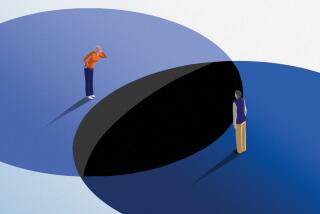Even Geniuses Aren’t Good at This Marriage Thing
- Share via
Marriage, I have always suspected, is harder than physics.
And now there is proof.
It comes in the form of Albert Einstein’s love letters, written around the turn of the century to the fellow physics student who would become his wife.
They are printed in the scientific journal “Physics Today” (which, believe me, has never been found in my bathroom) in a two-part story on Einstein’s ultimately doomed first marriage. The stories are excerpts from Harvard professor Gerald Holton’s book, “Einstein, History and Other Passions,” to be released in the fall.
The billets-doux are poignant in their torrid domesticity, devotion and diminutive. Often they segue into descriptions of Einstein’s groundbreaking ideas about physics.
Mileva is Albert’s “beloved witch,” “radiant little darling” and “dear kitten.”
“If only you were again with me for a while!” a 21-year-old Albert writes to a 24-year-old Mileva in August, 1900. “We understand so well each other’s dark souls, and also drinking coffee & eating sausages, etc. . . .”
Both sets of parents opposed the match, which, as we all know from reading that other genius, Shakespeare, only served to cement the bond.
No offense to all the hot-blooded physicists who are pausing long enough in the search for a unified field theory to read the newspaper today, but does not the idea of Albert Einstein as a passionate, young, parents-defying lover fire up a smile?
*
Domestic failure beset Einstein from his earliest adulthood. Unknown to scholars until Einstein’s descendants donated the letters to his archives in 1986, Albert and Mileva, who had two sons together, also had a daughter. Lieserl was born in secret a year before they married.
“We’ll be students as long as we live,” wrote Albert in 1901. “And we won’t give a damn about the world. . . . The only problem that still needs to be solved is the question of how we can take our Lieserl to us, I don’t want us to have to give her up. Ask your Papa, he’s an experienced man. . . . She shouldn’t be stuffed with cow’s milk, because it might make her stupid. I believe yours would be more nourishing; what do you think? I have had another rather obvious but important scientific idea about molecular forces.”
There is a reference in a 1903 letter to the child suffering scarlet fever, but according to Holton, no ones know if she survived.
In 1905, Einstein would publish “On the Electrodynamics of Moving Bodies,” in which he introduced his famous theory of relativity. And as his star rose, his marriage sunk.
“There is no doubt,” Holton writes, “that the birth of Lieserl took a heavy toll on Mileva. More and more after these secret events she tended to brood. Perhaps she was blaming herself for the decision to give up her daughter, or she blamed Albert for acquiescing in it or possibly even for urging it upon her. We simply don’t know.”
In 1909, Mileva described herself in a letter to a friend as “very starved for love.”
“You see,” wrote the woman who was once Einstein’s radiant little darling, “with such fame not much time remains for his wife. . . . The pearls are given to the one, the other gets just the shell.”
Mileva divorced Albert in 1919.
*
The elusive formula for happiness must involve a delicate balance of our two primary spheres, work and love. Is it possible to maintain zeniths in both? Can you be a great scientist and a passionate husband and devoted father?
Or is that too much to expect of any frail mortal?
I have a friend who has always maintained that no matter how hard she tries, she has never experienced domestic bliss at the same time she has soared on the job--or at least they have never coincided for very long. Life, she says, just can’t be that perfect.
And so it went with Einstein, who gave us three branches of physics, won a Nobel prize and made possible countless advances in technology. Marriage just wasn’t his discipline.
“Einstein conceded wistfully,” Holton writes, “that he had failed rather ignominiously in two attempts.”
Maybe in public terms, domestic bliss doesn’t rank up there with developing a grand unified theory. But if you’re happily married, consider yourself a success.
So what if you’re no Einstein? When it came to love, neither was he.







